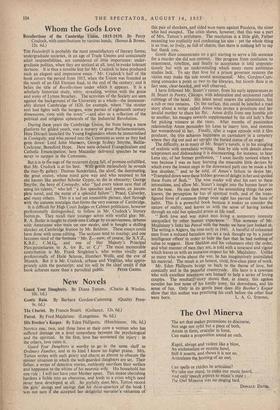New Novels
His Brother's Keeper. By Eden Phillpotts. (Hutchinson. 10s. 6d.)
NOVELS one, two, and three have at their core a woman who has suffered damage on a level somewhere between the psychological and the spiritual. In the first, love has worsened the injury : in the others, love cures it. Guard Your Daughters is worthy to go in the same shelf as Ordinary Families, and in its kind I know no higher praise. Mrs. Tutton writes with such gaiety and charm as almost to obscure the sinister situation in which the well-guarded daughters are set. Their father, a writer of detective stories, ruthlessly sacrifices their welfare and happiness to the whims of his neurotic wife. His household has one rule : I will not have your Mother upset. This insane cherishing hardens a foible into an obsession, and leads to a crisis which need never have developed at all. So joyfully does. Mrs. Tutton record the girls' doingS and sayings that for three-quarters of the book I was not sure if she accepted her delightful narrator's, valuation of this pair of shockers, and sided wan tnem against Pandora, the sister who had escaped. The crisis shows, however, that this was a part of Mrs. Tutton's artfulness. The resolution is a little glib, Father recanting too explicitly and confessing his sins : yet the whole thing is so true, so lively, so full of charm, that there is nothing left to say but thank you.
Gentle Rain concentrates on a girl starting to serve a life sentence for a murder she did not commit. Her progress from confusion to resentment, rebellion, and finally to acceptance is told unpreten- tiously but with an understanding which many more ambitious studies lack. To say that love for a prison governor restores the victim may make the tale sound sentimental. Mrs. Gordon-Cum- ming concedes a point or two to the libraries, but Gentle Rain is in fact sane, clear-headed, and well observed.
I have followed Mr. Stuart's career, from his early appearances as H. Stuart in Poetry, Chicago, with admiration and occasional rueful rubbings of the head. His latest novel renews the admiration, but a rub or two remains. On the surface, this could be labelled a mad story about a writer called Amos who invites a prostitute and her invalid mother to share his flat. Amos drifts from one humble job to another, his meagre rewards supplemented by the old lady's flair for picking winners at the races. After months of passionless relationship Amos persuades his Lena to marry him, and restores her womanhood to her. Finally, after a vague episode with a film producer, the trio achieves happiness as caretakers in a cemetery where they dig out and set upright the buried statue of an angel. The difficulty, as in many of Mr. Stuart's novels, is in his mingling of realistic with unrealistic writing. Side by side with details about teleprinters and dishwashing it is disconcerting, for instance, to hear Lena say, of her former profession, " I soon hardly noticed where I was because I was so busy learning the miserable little devices by /which even the lowest steps in the downward path can be made a bit less desolate," and to be told, of Amos's failure to desire her, "Trampled down were these hidden groves of delight in her and spoiled these fruits of flesh." The wise reader will shut his ears to these intonations, and allow Mr. Stuart's insight into the human heart to set the tune. He can then marvel at the astonishing things the poet knows, the perception he has of spiritual truth, and of the trans- figured form of common things once sight has pierced the haze of habit. This is a powerful book because it makes us consider the nature of reality, and leaves us with the sense of having looked through an odd but splendid prism at life itself. " Both love and war inject into living a temporary intensity unequalled by other human experience." This sentence of Mr. Majdalany's links his Patrol with the books we have just looked at. The setting is Algiers, the time early in 1943. A handful of exhausted men from a reduced battalion are set a task thought up by a junior intelligence officer in order to hide' the fact that he had nothing of value to suggest. How Sheldon and his volunteers obey the order, and what manner of men they are, is told with a terseness and vigour which leaves us with an immense respect for Mr. Majdalany. Unlike so many who write about the war, he has imaginatively assimilated his material. The result is an honest, vivid, first-class piece of work. Mr. Eden Phillpotts brings us back to the theme of love, but comically and in the peaceful countryside. His hero is a cowman who with excellent intentions sets himself to help a series of loving couples. The resultant' story shows that, at ninety, this ageless novelist has lost none of his kindly irony, his shrewdness, and his sense of fun. Only in its gentle pace does His Brother's Keeper show that this author was practising his craft before the other four


































 Previous page
Previous page